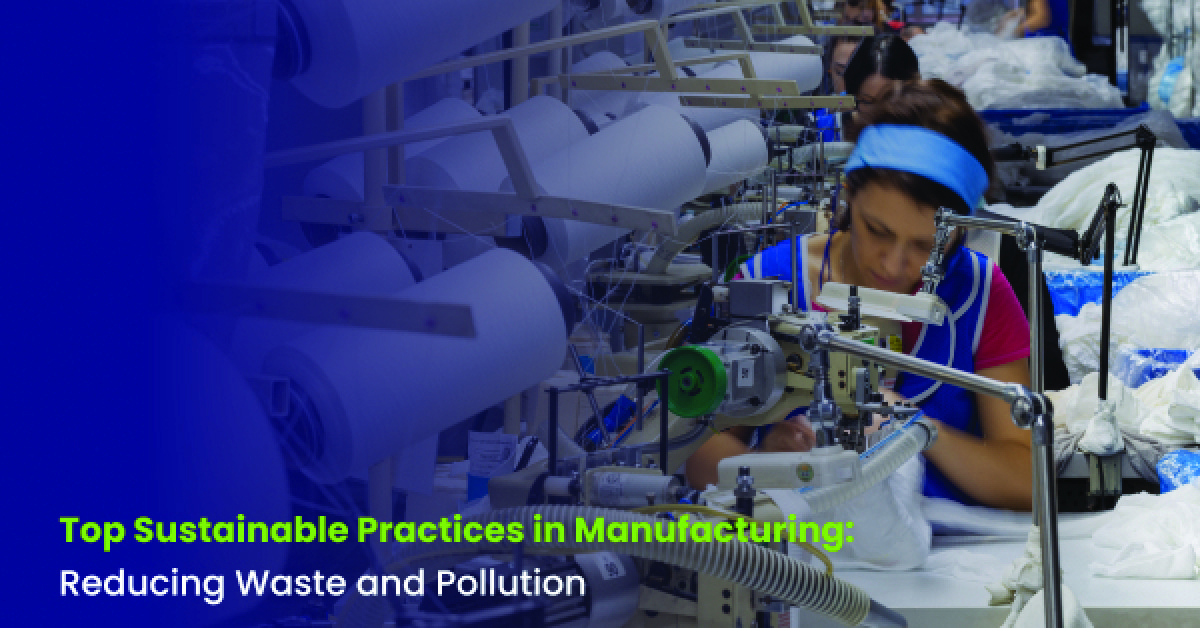What if I told you that the products you buy could either harm or heal the planet? Sustainability in manufacturing is no longer an afterthought, it’s a necessity. And guess what? We all have a role to play. From your daily coffee cup to the shoes on your feet, every item has an impact on our environment. But as businesses begin to adopt greener practices, we are seeing a shift that’s not just good for the planet, but good for their bottom line too. Curious about how?
Let’s dive into the world of sustainable manufacturing and how it’s reshaping our future.
What Is Sustainable Manufacturing?
Imagine a world where every product you buy was created with the planet in mind. The materials, energy, and processes used in the making of that product are all carefully considered to minimize their environmental impact. This is the heart of sustainable manufacturing.
In simple terms, sustainable manufacturing means using processes that are environmentally friendly while also being economically viable and socially responsible. Think of it as a balancing act. Manufacturers are tasked with producing goods, but they must do so while being mindful of resource conservation and waste reduction. For instance, let’s take a simple example: a small business that manufactures t-shirts. Traditionally, the production might involve toxic dyes, excessive water use, and poor labour conditions. But a sustainable manufacturing approach would involve choosing organic cotton, using water-efficient dyeing techniques and ensuring fair wages for workers. By rethinking how products are made, companies can help reduce pollution, minimize waste and conserve natural resources.
One well-known example is Patagonia; an outdoor clothing brand committed to sustainability. They use recycled materials in their products, offer a repair service to extend product life and advocate for environmental causes. Their approach demonstrates that businesses can thrive while also protecting the environment.
The Importance of Sustainable Manufacturing: Why It Matters
Sustainable manufacturing isn’t just a trend – it’s a necessity for the future of business. According to a report by the United Nations Industrial Development Organization (UNIDO), industries contribute to over 30% of global greenhouse gas emissions, with the manufacturing sector being a significant part of that. But the shift toward sustainability offers a host of benefits for companies, workers and the planet. Here’s why it matters:
1. Environmental Impact Reduction:
Sustainable manufacturing practices help minimize the depletion of natural resources. It reduces harmful emissions, optimizes energy consumption, and decreases waste production, making a huge impact on the environment.
According to the World Economic Forum, global waste generation is expected to increase by 70% by 2050 if current trends continue. This makes it more urgent for industries to adopt practices that reduce waste and use resources efficiently.
2. Economic Savings:
Sustainable manufacturing practices help companies save money by reducing energy use, cutting down on material waste, and improving production efficiency. Companies that adopt green technologies often reduce their operational costs making them more competitive in the long run.
A McKinsey report states that companies that implement energy-efficient technologies can cut energy costs by up to 15% to 30%. This directly impacts their bottom line, helping them operate more profitably.
3. Consumer Demand for Eco-Friendly Products:
As consumers become more eco-conscious, they are increasingly choosing products from companies that prioritize sustainability. Businesses that embrace green practices not only enhance their reputation but also attract a loyal customer base that values environmental responsibility.
4. Regulatory Compliance:
Governments around the world are introducing stricter environmental regulations. Companies that adopt sustainable manufacturing practices ensure compliance with these regulations avoiding potential fines and reputational damage.
Key Sustainable Practices in Manufacturing
Now, let’s break down the top sustainable practices in manufacturing that companies can adopt to reduce waste and pollution:
1. Energy-Efficient Technologies
Energy efficiency is the cornerstone of sustainable manufacturing. By upgrading equipment and adopting advanced energy management systems, manufacturers can reduce their energy consumption and carbon footprint. For example, companies like Siemens have integrated renewable energy sources like solar and wind into their operations, significantly reducing their reliance on fossil fuels.
2. Waste Reduction and Recycling
One of the biggest challenges in manufacturing is the amount of waste generated. To combat these businesses should adopt lean manufacturing principles that focus on minimizing waste and optimizing resources. Companies like Unilever have implemented recycling programs and even turned packaging waste into reusable materials.
3. Sustainable Materials
The materials used in manufacturing have a significant environmental impact. By opting for recycled, biodegradable, or renewable materials, businesses can reduce their carbon footprint. For instance, Ikea has committed to using only renewable or recycled materials in its products by 2030, a game-changing move in the furniture industry.
4. Water Conservation
Manufacturing processes often use vast amounts of water. By adopting water-efficient technologies and recycling water during production, manufacturers can significantly reduce water consumption. This not only helps preserve water resources but also reduces operational costs.
5. Circular Economy
The circular economy focuses on the lifecycle of products, ensuring they are reused, repaired, or recycled instead of ending up as waste. Companies are adopting this model by designing products that can be disassembled and reused at the end of their life cycle, like Dell, which has a program to recycle old electronics and turn them into new products.
Case Studies of Sustainable Manufacturing Success
1. Baggit
Baggit, an Indian fashion brand, has emerged as a leader in sustainable bag manufacturing. The company uses eco-friendly materials such as vegan leather and recycled fabrics in its product lines. Baggit’s commitment to cruelty-free, sustainable production practices has set it apart in the accessories market, offering stylish options without compromising on environmental values. The brand also emphasizes minimal waste during production and sustainable packaging.
2. Patagonia
Known for its eco-conscious approach, Patagonia uses recycled materials in its clothing and offers repair services to extend the life of its products. There Worn Wear program encourages customers to trade in old clothes for store credit, promoting the idea of reusing and recycling.
3. Terra Thread
Terra Thread produces sustainable backpacks, totes, and duffel bags made from Fairtrade Certified organic cotton. The company maintains a transparent supply chain and partners with factories that follow ethical labour practices. Terra Thread also supports environmental initiatives like carbon-neutral shipping and contributes a portion of profits to social and environmental causes. Their commitment to traceability and impact reduction showcases a holistic approach to sustainability.
Challenges and Solutions
While the benefits of sustainable manufacturing are clear, there are challenges that companies face when implementing these practices. One of the major challenges is the initial cost of transitioning to sustainable processes. However, over time, these investments pay off in terms of energy savings, reduced waste and improved efficiency.
Technological barriers also pose a challenge, as many manufacturers may not have access to the latest innovations. However, AI-driven tools and real-time monitoring systems can bridge this gap by optimizing energy use and identifying areas for improvement in real-time.
Moreover, regulatory compliance can be complex, especially for companies operating in multiple countries. However, adhering to sustainability standards ensures that companies remain competitive and avoid penalties.
Future Trends in Sustainable Manufacturing
The future of sustainable manufacturing looks exciting, thanks to emerging technologies and trends that are reshaping the industry. Artificial intelligence (AI) and smart manufacturing are driving innovation, enabling companies to optimize their operations in real-time and reduce waste even further.
The use of blockchain technology in supply chains is also gaining traction, providing greater transparency and traceability in sourcing sustainable materials. As these technologies continue to evolve, we can expect even more efficient and eco-friendly manufacturing processes.
Additionally, product lifecycle sustainability is becoming a key focus, with manufacturers designing products with longevity and recyclability in mind. The rise of the circular economy will also drive the growth of sustainable practices in manufacturing, ensuring that products are reused and repurposed rather than discarded.
Conclusion
Sustainable manufacturing isn’t just a trend, it’s the future. By embracing energy-efficient technologies, reducing waste and focusing on sustainability in every aspect of the production process, companies can make a meaningful impact on the environment and their bottom line.
As consumers, we can also contribute by choosing products from companies that prioritize sustainability. The path to a greener more sustainable future begins with the choices we make today.
Let’s act now, for our planet, for our future.


